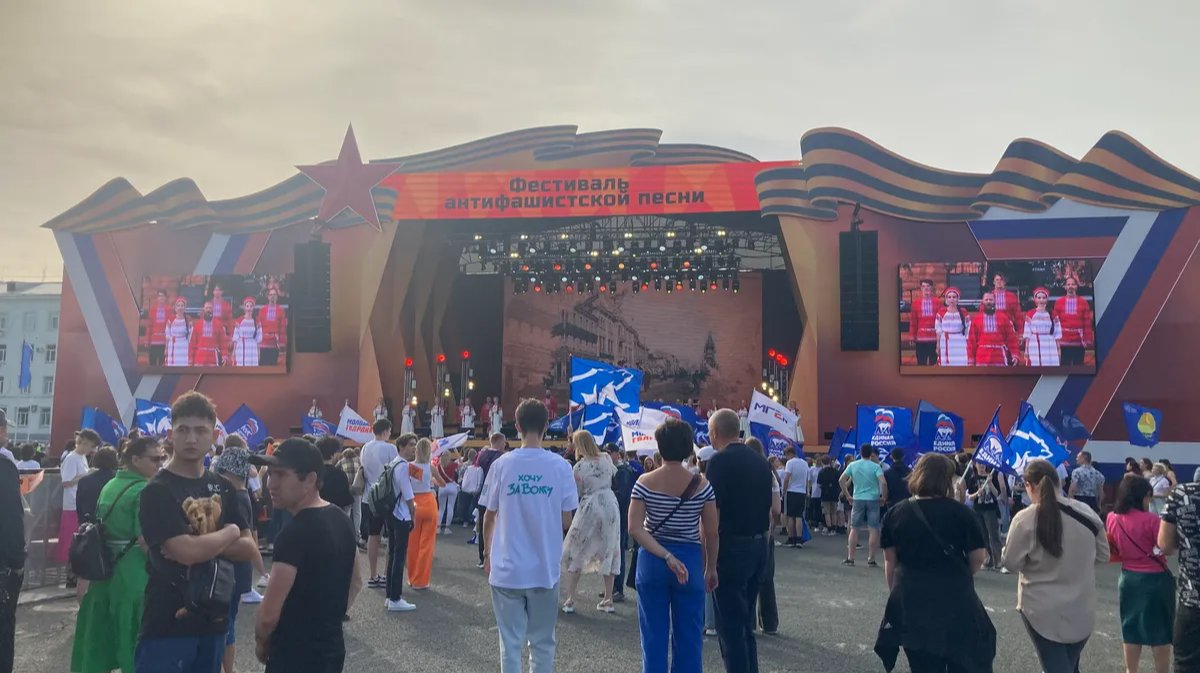An “anti-fascist song festival” took place in Samara last week. Six days from morning till evening were filled with a fierce struggle for peace and a rapturous extolment of the allure of the trenches. If you thought that the regime wants the Russian people to see the war as something routine, you were wrong: war is all about old war songs and the pinings of a distant sweetheart. If you thought that the current war would destroy Russia’s memory of the past war, you were wrong again: the two wars must now merge in the mind of the Russian citizen into a single battle against the collective West.
On the evening of Saturday, 6 May, shortly before the gala concert that crowned the whole affair kicked off, a “mobile recruitment station for military service under contract” was set up at a minibus in Samara’s central square. The public shed tears and sang along to military songs, but there was no queue at the minibus.
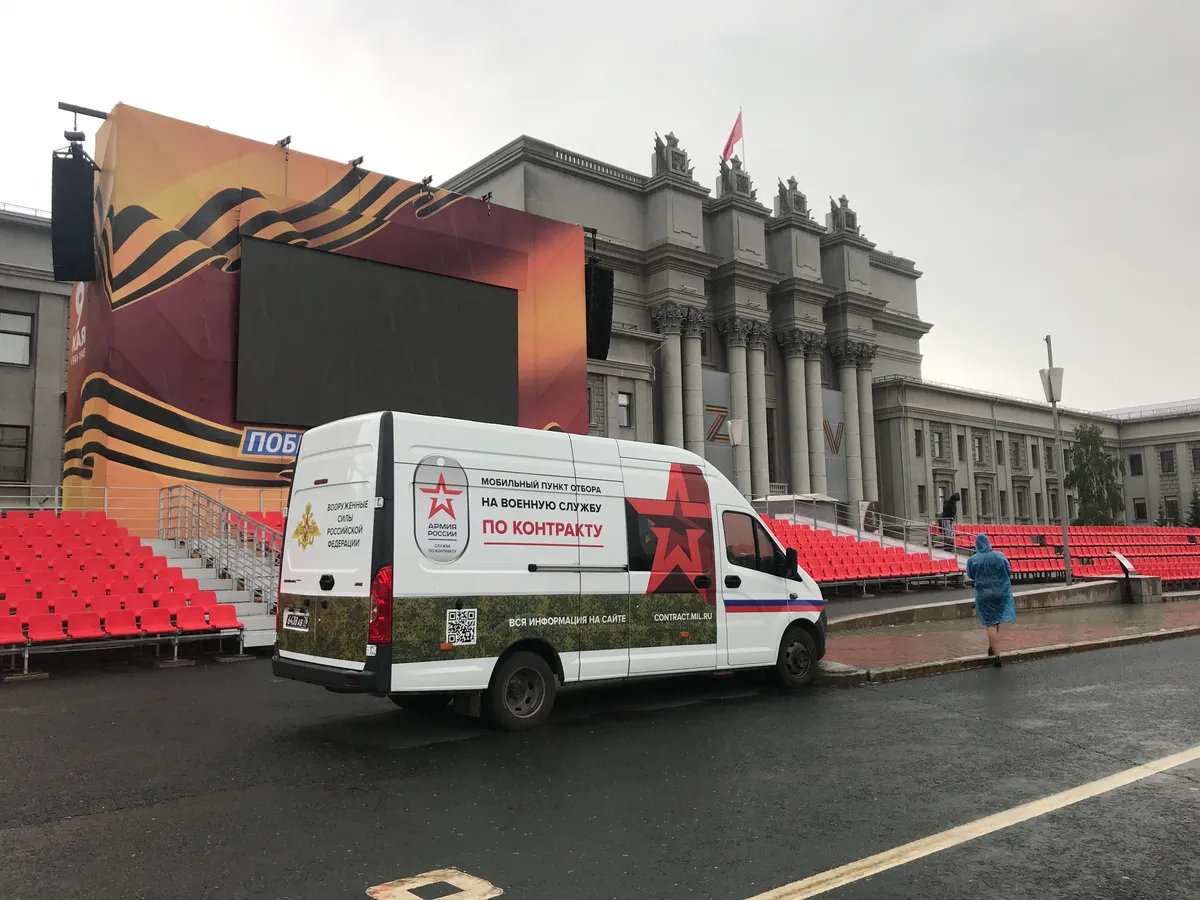
Mobile military recruitment station. Photo: Irina Leonova, exclusively for Novaya Gazeta Europe
Among the tents that made up the “festival village” in the square, one could see many young men dressed in Soviet military uniforms.
They eagerly posed for photos with their mess tins and helmets, but for some reason stayed away from the minibus.
I asked one of these reenactors if he wanted to go to the “mobile recruitment station”. The man was very surprised by the question.
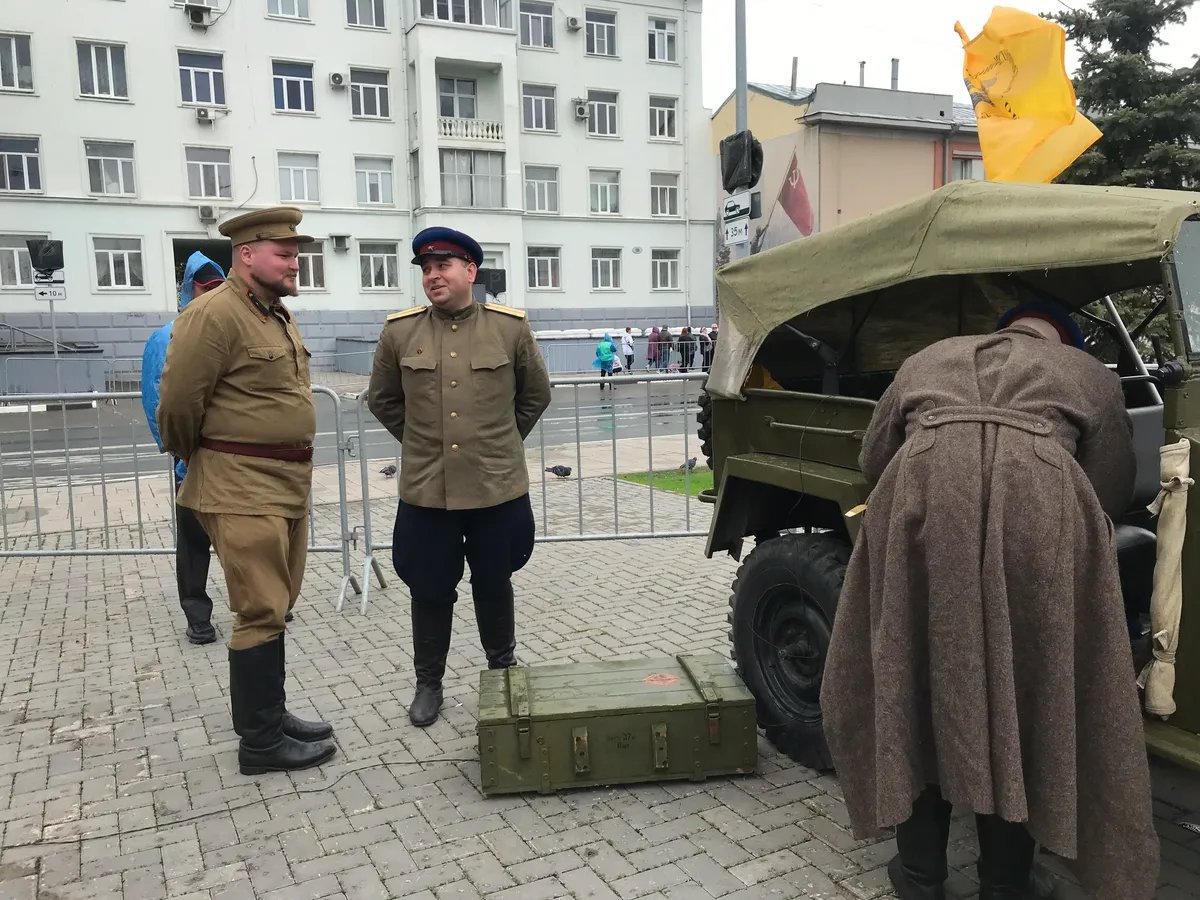
Photo: Irina Leonova, exclusively for Novaya Gazeta Europe
The gala concert that wrapped up the festival was beautiful. Seriously, it was very well organised and must have cost a lot of money, if only because the stars who agreed to take part in it had to be flown in from across the ocean.
And everything would have been fine, were it not for the time and place. An anti-fascist concert with such songs and speeches would fit well in Kyiv, for instance. For it to work in Samara, it would have to have happened before 24 February 2022. But the concert took place after the horrors in Kharkiv, Kramatorsk, Bucha, Irpin, Dnipro, Uman… The anti-fascist gala concert, which topped off an anti-fascist festival, was held in a state whose army has invaded the neighbouring country. Was this the peak of cynicism or a symptom of a severe mental illness? For a week, I watched this unbridled display of patriotism, trying to find a fitting word for what has happened to these people.
Cast of characters
The “anti-fascist song festival” was conveniently scheduled to be associated with both May Day and Victory Day.
It began on 1 May with a procession carrying flags of the United Russia party and ended late on Saturday night with a six-hour gala concert.
No other region in the country has thought of such a thing, and it was the Samara authorities who initiated the event. But the regime kept an eye on them nonetheless: co-organising the festival, weirdly enough, was the Moscow-based “Scottish Cultural Centre”. Note that in spite of the “Scottish” bit, it has not been branded a foreign agent.
The festival was advertised as being international — there is no point in fighting for peace on one’s own, right? And several guest stars from abroad were indeed brought to Samara.
These included: the band LiberArte from Nicaragua, kilt-clad Scottish bagpiper Jimi McRae (who, as is the custom at music festivals, seemed occasionally to be a bit on the drunk side); Catalan rock band Opcio K-95 (they explicitly asked not to be called Spanish); soon-to-be opera singer from France François Modeme (he visited the front lines in Ukraine and now studies at the Moscow Conservatory); Slovenian pianist Sašo Gačnik (stage name Svarogov), and the special guest that everybody couldn’t wait to see — Steven Seagal, “a real Russian man”, as he was announced onto the stage. Just imagine the budget of the festival.
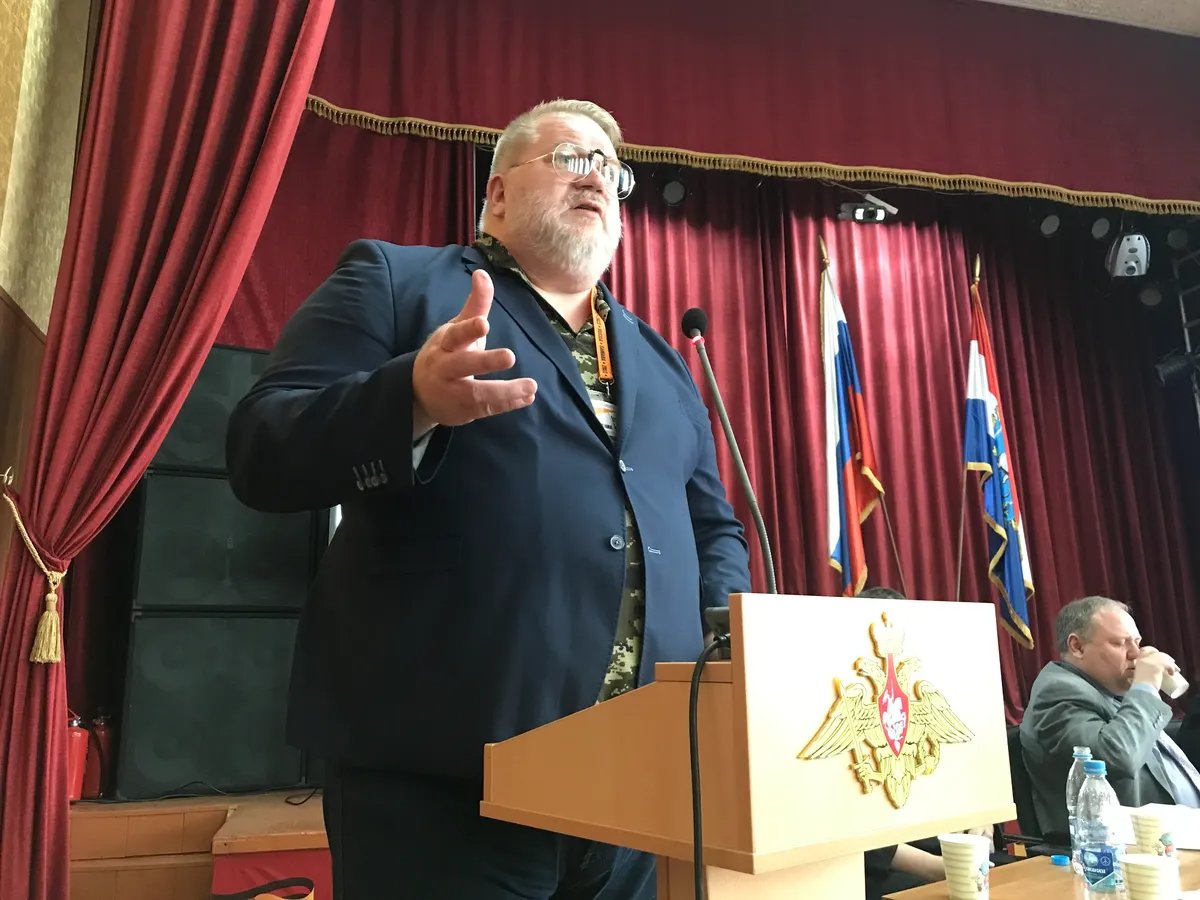
Johan Bäckman. Photo: Irina Leonova, exclusively for Novaya Gazeta Europe
In addition to the list above, there were two guests from abroad who were introduced as human rights defenders. The first was Johan Bäckman, a Finn who is well known in Russia for his activism: he had fought against Finland’s juvenile justice system, supported the Russian law banning the adoption of Russian children by foreigners, and in 2014 became an “independent observer” of the “referendum” in the annexed Crimea.
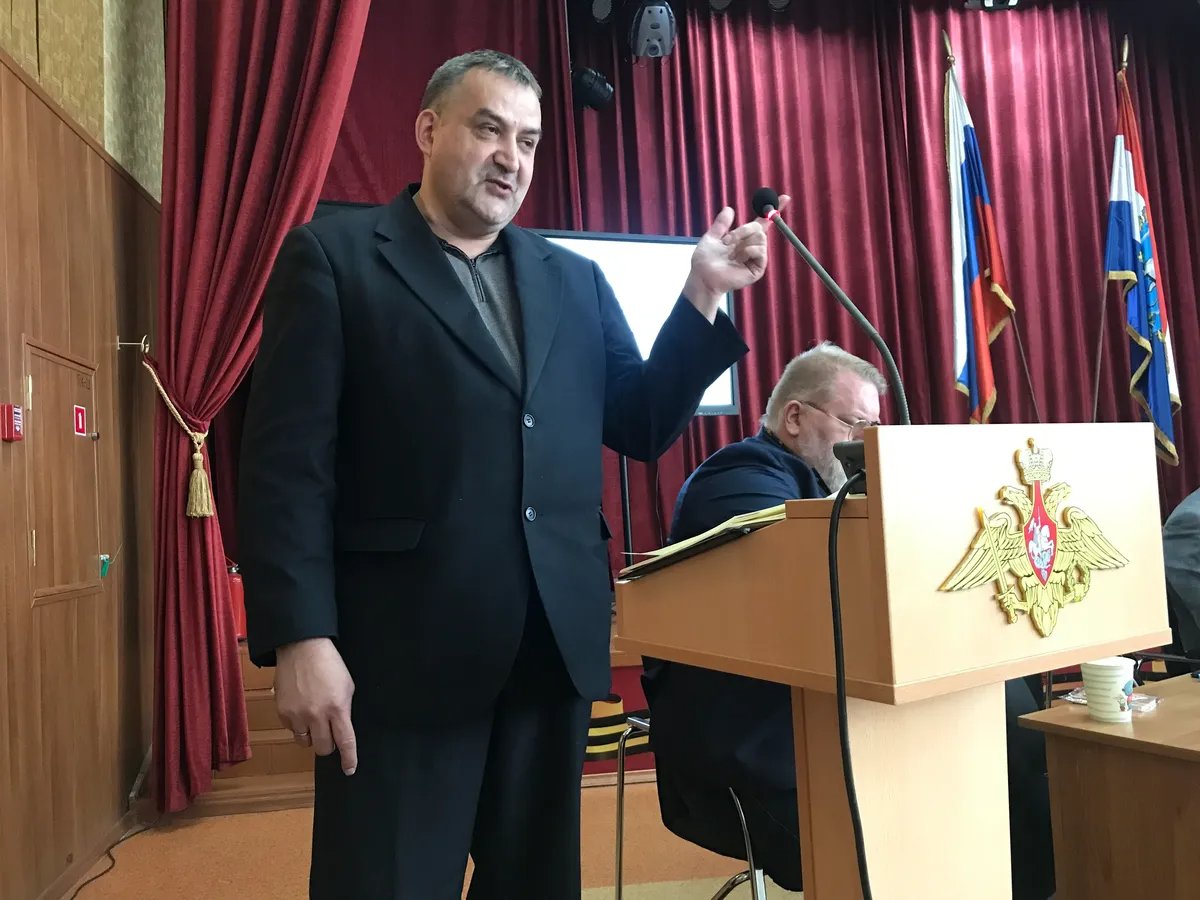
Giedrius Grabauskas. Photo: Irina Leonova, exclusively for Novaya Gazeta Europe
The second “human rights defender” was Lithuanian-born journalist Giedrius Hrabauskas. He said that he is currently fighting for the rights of a colleague of his who has been imprisoned by “Latvian fascists” for attempting to tell the truth: he is allegedly being tortured and starved. The participants of the festival loudly admired Giedrius’ bravery: what encouraged him to travel to Russia from dangerous Lithuania? How can you go back there, dear friend? Stay here, in our free country! Giedrius smiled modestly and did not reassure his stage companions on his part, though he has been living in Russia since 2020.
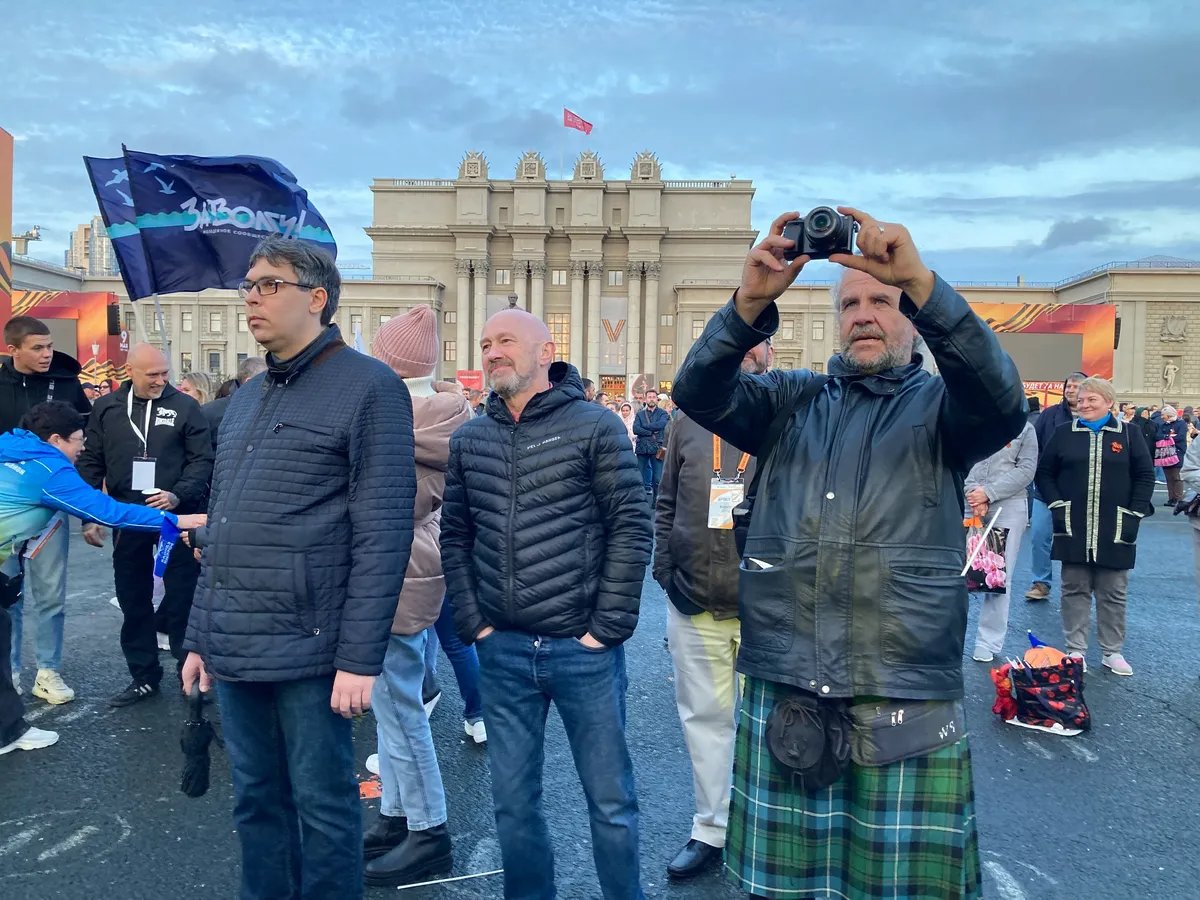
Michael Church and Jimi McRae. Photo: Irina Leonova, exclusively for Novaya Gazeta Europe
Another foreign guest was the ever-smiling English children’s author Michael Church, a fan of Leo Tolstoy and all things Russian literature.
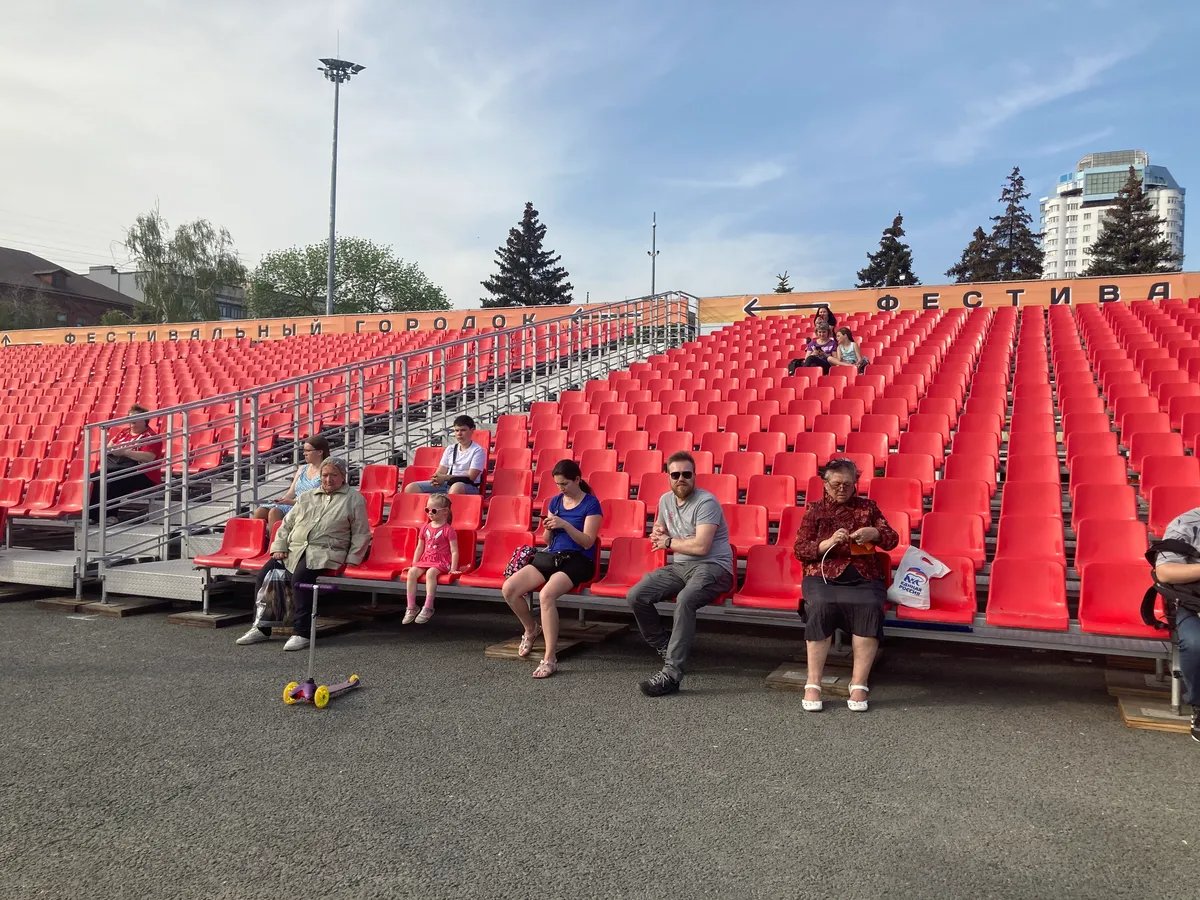
Photo: Irina Leonova, exclusively for Novaya Gazeta Europe
The concert
On the evening before closing day, the temperature dropped sharply, and the next morning started with rain. For the first two hours of the show the audience was wet, then cold, but people kept on arriving.
The concert had just started. Onstage, the “Grenada” folk ensemble were singing “Katyusha”, while behind them flickered a slideshow of wartime photos.
One of the pictures showed the “heroes of the Arctic convoys”. By this point, I had visited enough of such events to understand their antics, so this seemed like a poor choice of illustration, since it might remind somebody in the audience what it was that these convoys were transporting starting in August 1941 up until May 1945. They were delivering US assistance to the USSR under the lend-lease programme. Kind of like Kyiv is receiving Western aid nowadays.
“Do you know what these convoys were about and who these people were?” I asked a middle-aged woman who was wrapping up a little boy in her cardigan.
“Well, we had these heroic convoys”, she shrugged. “Our Soviet convoys were guarding something.”
Next onstage was Scotsman Jimi McRae with his bagpipes. In the preceding week, his performance of Russian war songs had made him the audience’s favourite.
Afterwards, the Rastrelli Cello Quartet took to the stage.
The four cellists were presented all week as a Russian-German ensemble — even though their founder Kirill Kravtsov mentioned several times how he had suffered in Germany and therefore returned to Russia.
“What a paradoxical phenomenon,” the presenter said poignantly.
“We’ve just mentioned the events of 80 years ago, when Russia and the Nazi Reich clashed as adversaries, and now on our stage Russia and Germany are united within this quartet!”
Next on the bill was Sergei Voitenko, a button accordionist from Samara.
“We hoist the tricolour flags over the liberated territories just like our grandfathers hoisted the flags over the Reichstag back in 1945, as they broke the backbone of fascism”, Voitenko said prefacing a song of his. “And our soldiers now continue the glorious traditions of valour and honour. We have always known: Russia does not start wars, it ends them! Our cause is just! Victory will be ours!”
The square applauded: of course, we never start wars, and breaking the backbone of fascism for us is as mundane as brushing our teeth.
The slideshow in the background showed brave Russian soldiers marching, planes zipping across the sky, people in camouflage uniforms with the word “FSB” on them successfully storming something — one victorious image after the other.
Such a triumph of the will, accompanied by Voitenko’s singing, was a breathtaking spectacle. “Victory will be ours, and peace will last for centuries”, Voitenko intoned.
Afterwards, several local bands performed — “Samara guys”, as presenters called them affectionately. Their schtick included patriotic rap.
When it was time for a foreign guest star, Slovenian pianist, composer and singer Sašo Gačnik came onto the stage. “...Actively engaged in charity work,” the festival’s website said of him.
“He advocates for preserving the historical memory of the Soviet people’s decisive contribution in defeating Nazism during World War II, for which he has been widely praised in Slovene society.”
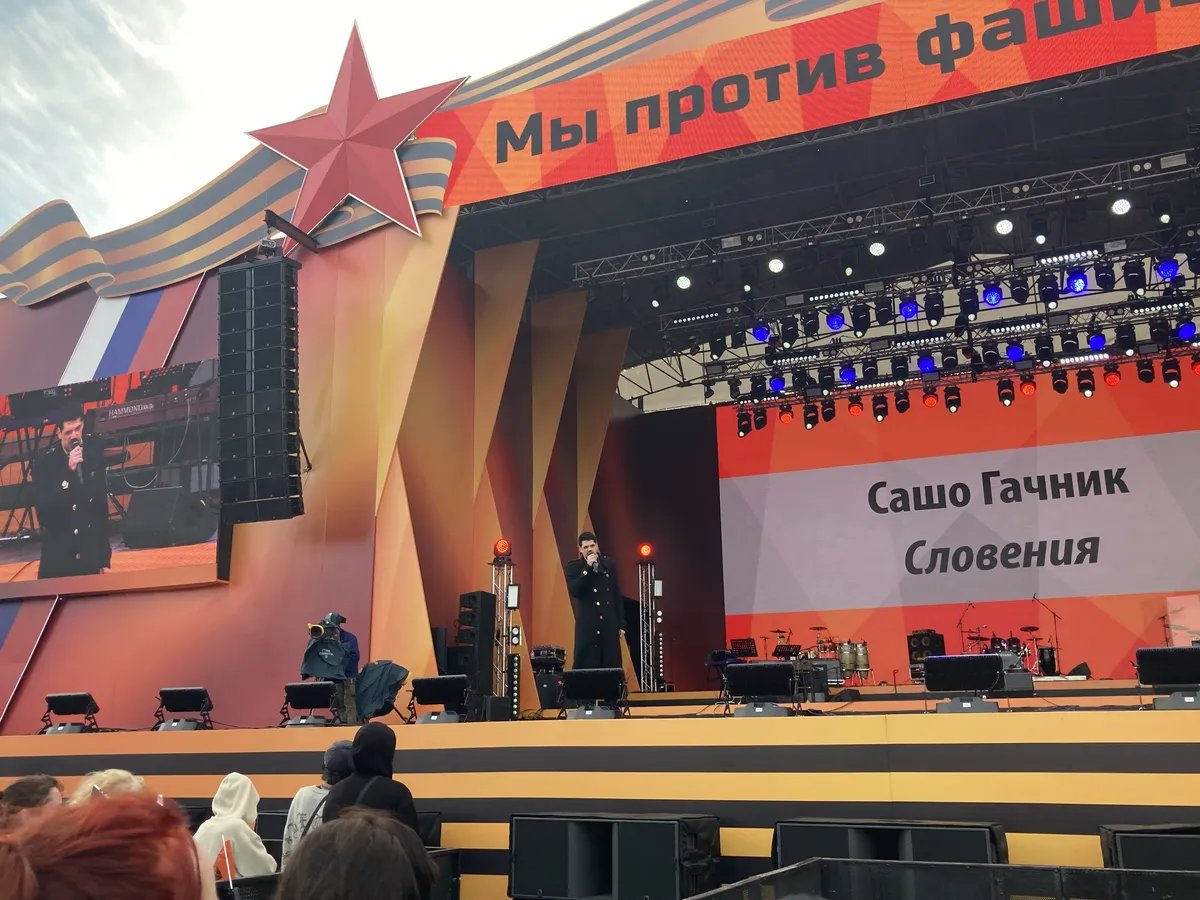
Sašo Gačnik. Photo: Irina Leonova, exclusively for Novaya Gazeta Europe
Sašo played the piano very well, and sung several classic war songs of the heartbreaking kind. He did such a good job that the women in the square were brought to tears.
“We love you!”, girls next to the stage cried in English.
I don’t know whether Gačnik realised which country those songs apply to now, after 24 February, 2022. The people in the square listened as if it were still about them. This was probably what frightened me the most during this “anti-fascist” week: that people had already accepted this war as they had been taught to perceive the Great Patriotic War. Moreover, just like WWII, this war exists for them in a parallel universe — only the distance is measured in kilometres and not in years. Here, we have guitars and songs. The trenches and corpses, the blood and pain — that’s all far away somewhere.
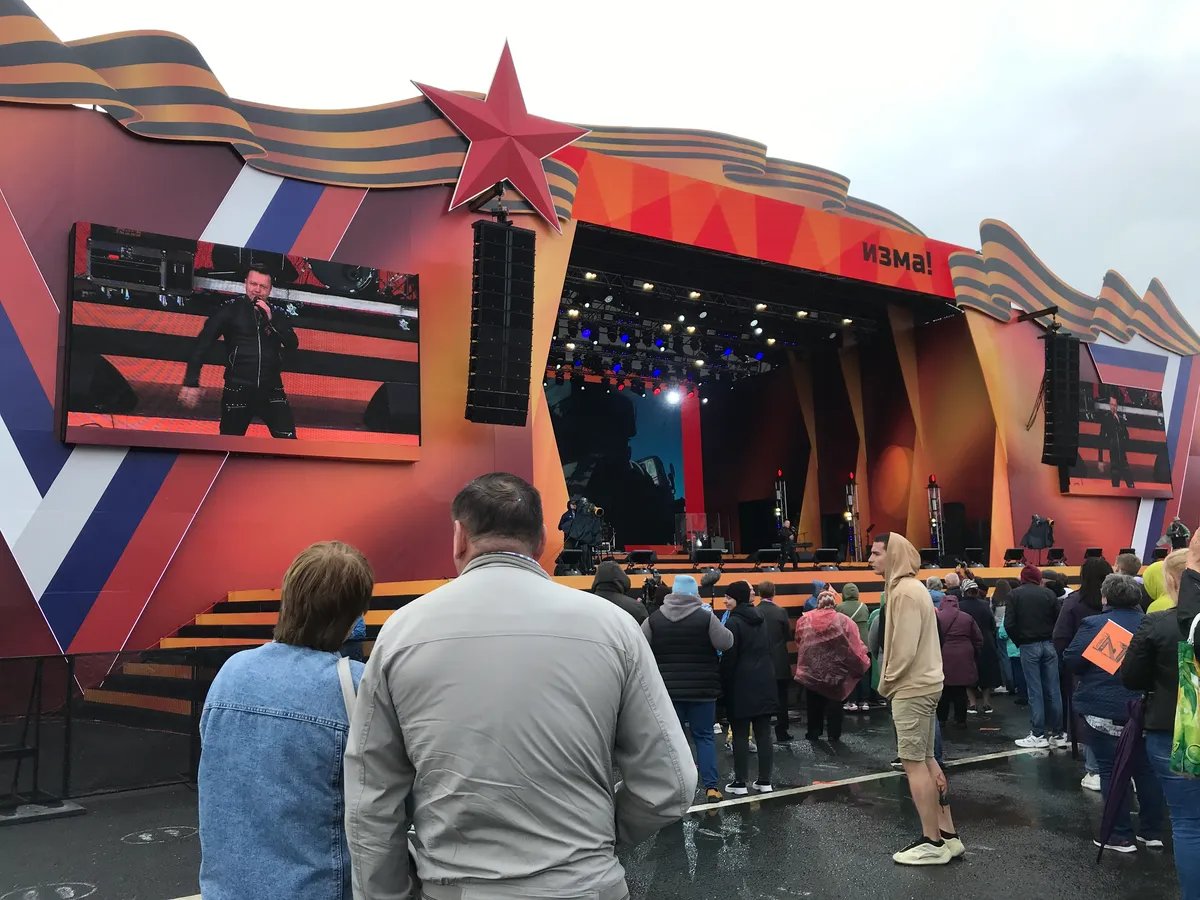
Photo: Irina Leonova, exclusively for Novaya Gazeta Europe
The speeches and declarations onstage reeked of such battlefield romanticism that one couldn’t help but think that the enlistment minibus was about to be swamped by volunteers. Alas — the men in the crowd sang along, clapped, someone even shed a tear, but nobody went to the minibus. Who needs military service when there is plenty of battlefield romanticism right here? Before my eyes stood the image of a girl who died in the bombing of Uman. All the while, in the heart of Russia, similar girls and their parents eagerly played at a make-believe war with “our cause is just” antics.
In the meanwhile, Voitenko was singing “the enemy has come to the doorstep”. I could see from the spectators’ faces that they really believed that the enemy had come to them and not vice versa. Voitenko finished singing, quoted “our President Vladimir Putin”, mentioned the classic “eight years of bombing Donbas” mantra, and, getting more and more impassioned, started shouting: “We are R-r-russians!” In terms of decibels, he definitely ended on a high note.
Voitenko was followed by Moscow Conservatory student François Modeme. “A former member of the French army. A staunch anti-fascist, he volunteered in the Donbas in 2014 to protect civilians from Ukrainian Nazis and nationalists. Has participated in the special military operation,” the festival’s website states.
Next up was the band Opcio K-95 from Catalonia. Through the din of rock music, their frontman cried into the audience: Cataluña no es España!
A videotape of Maria Zakharova, spokeswoman for the Russian Foreign Ministry, acted as an intermission between the musical performances.
The former allies of the USSR “brought fascism back to Europe instead of building a common peace”, the speech claimed. It went on in a similar vein — complete with “henchmen” and other vivid imagery. I won’t quote Zakharova because nobody really listened to her in the square either, just waiting for the music to restart.
The highlight of the evening (towards the end of the fifth hour) was a joint performance by all the festival’s participants. For some reason, they chose the Italian protest and partisan song “Bella Ciao”. Some of it was sung in Russian — this line, for instance: “We will fight to the end for the freedom of our homeland”. And you cannot even argue with that.
Then came another pre-recorded video — the participants’ anti-fascist manifesto. Everyone spoke their own language, and if you compare the speeches the result is quite curious. They were in effect speaking about different things. I had already suspected this during the round table discussions that involved some of the performers, but at the gala concert it became glaringly obvious.
Here is what you get if you put together the foreign guests’ English and Spanish speeches: “Dear friends and kindred spirits, whatever language you speak... The peoples of the world (translated into Russian as “the peoples of our countries”) will never forget the decisive contribution of the Soviet Union to the defeat of Nazi Germany and to the peaceful future of all mankind... [We], descendants of soldiers, sailors, and airmen of the armies of the Soviet Union’s allies and other nations... acknowledge and remember the terrible price that the Russian people and the other peoples of the USSR paid…”
And here’s how the Russian bits of the manifesto went:
“Today, fascism is raising its ugly head again. Once again, the leaders of another major Western power (unspecified) are proclaiming the exclusivity of their nation and their right to rule the world.
Once again, we hear about [the need to] destroy Russia, cancel Russian culture and history, and eliminate the Russian people as a whole. Which means that our Motherland is in danger — again. And so, once again, as in 1941, all of us, especially our country’s youth, must fall into line. We must unite in the fight against a common enemy — fascist Western imperialism and neo-colonialism... They did not succeed back in 1945, and they will not succeed now.”
Towards the end of the evening, Samara Governor Dmitri Azarov invited a “true Russian patriot” to the stage — Steven Seagal.
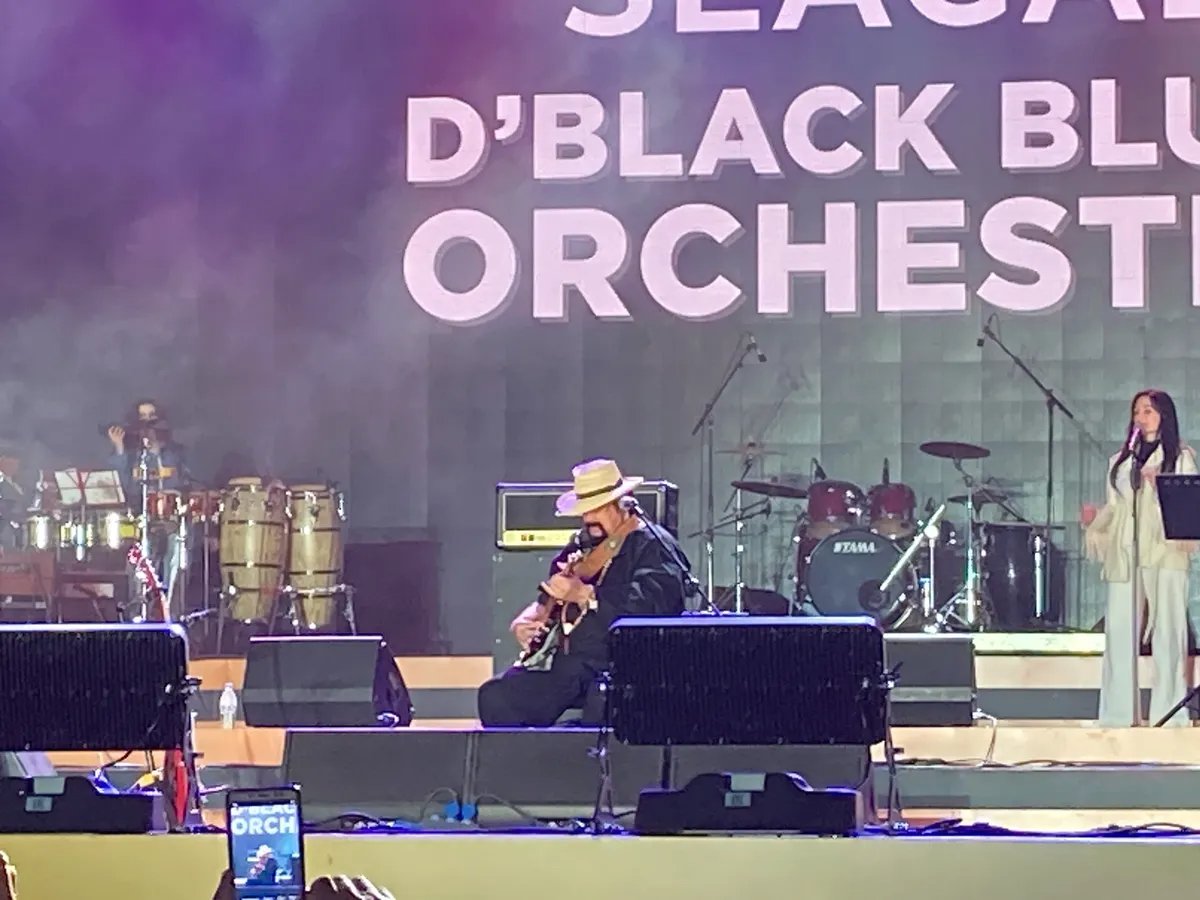
Steven Seagal. Photo: Irina Leonova, exclusively for Novaya Gazeta Europe
Seagal arrived in Samara with a 10-people band, technical staff, and so much equipment that it took an extra half hour to set up. Finally, Seagal came out, sat on a small chair, and sang for about an hour.
On the “Banderisation of Europe”
The festival would have been a waste of time and money if it had only been about song and dance. All six days had the leitmotif of indoctrinating the younger generation. On 1 May, schoolchildren were brought en masse to tents near the concert square. There, they had to listen to volunteers from the United Russia party and fighters (assuring that they had only just returned from the Donbas) take turns talking about their “struggle against Nazism”. “Eight years of bombings in the Donbas” and the rest of that schtick.
Among the topics of the festival’s round-table discussions was the falsification of history.
Speakers included local philosophy professor Yaroslav Levin with a report on Nazism, cellist Kirill Kravtsov and British children’s writer Michael Church, very popular with the students who were present. And he was the one to ruin everything.
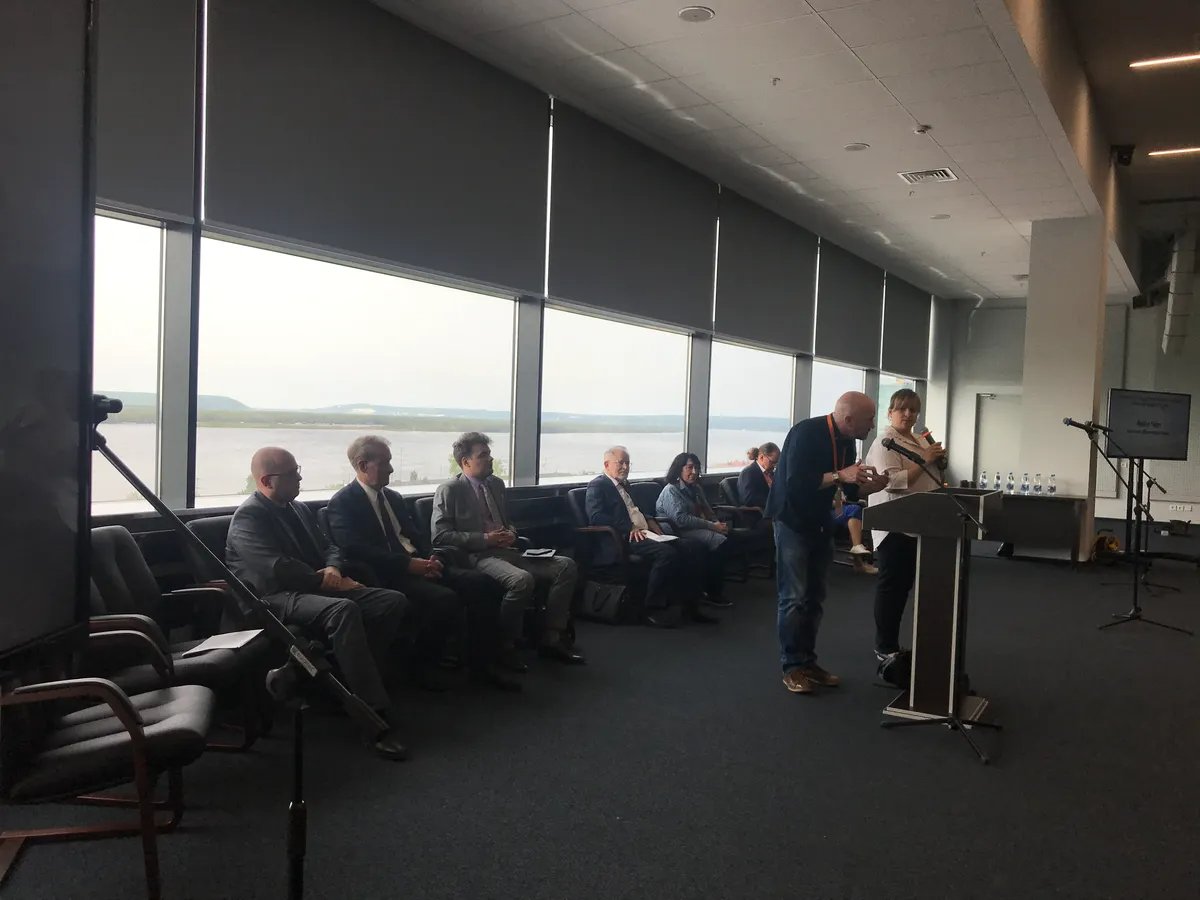
Michael Church. Photo: Irina Leonova, exclusively for Novaya Gazeta Europe
Church said he had been a schoolteacher for 20 years before taking up writing children’s books because he asked himself: what do we teach children, what sort of truth do we tell them? “We teach them the truth,” his interpreter added. His speech was all about the West being unfair to Russia, so it was safe to translate verbatim. But for some reason that didn’t work out.
“There is no doubt that there’s a clear message in the West now: Zelensky is good, Putin is bad,” Church said.
“Zelensky is good, Putin…” the interpreter faltered at the word “bad” and, after a pause, concluded with “...is not.”
Church talked about his love for Russia and Russian literature (Leo Tolstoy in particular). Then he talked about his own book, which tells the story of a boy who dreams of becoming a superhero but then realises that a hero is just an ordinary person who, instead of fighting somebody, saves lives — like a doctor.
He read his book aloud, acting out the different characters. The students laughed, applauded, and didn’t want to let him go. With one children’s tale he had outdone three days of glorifying heroism.
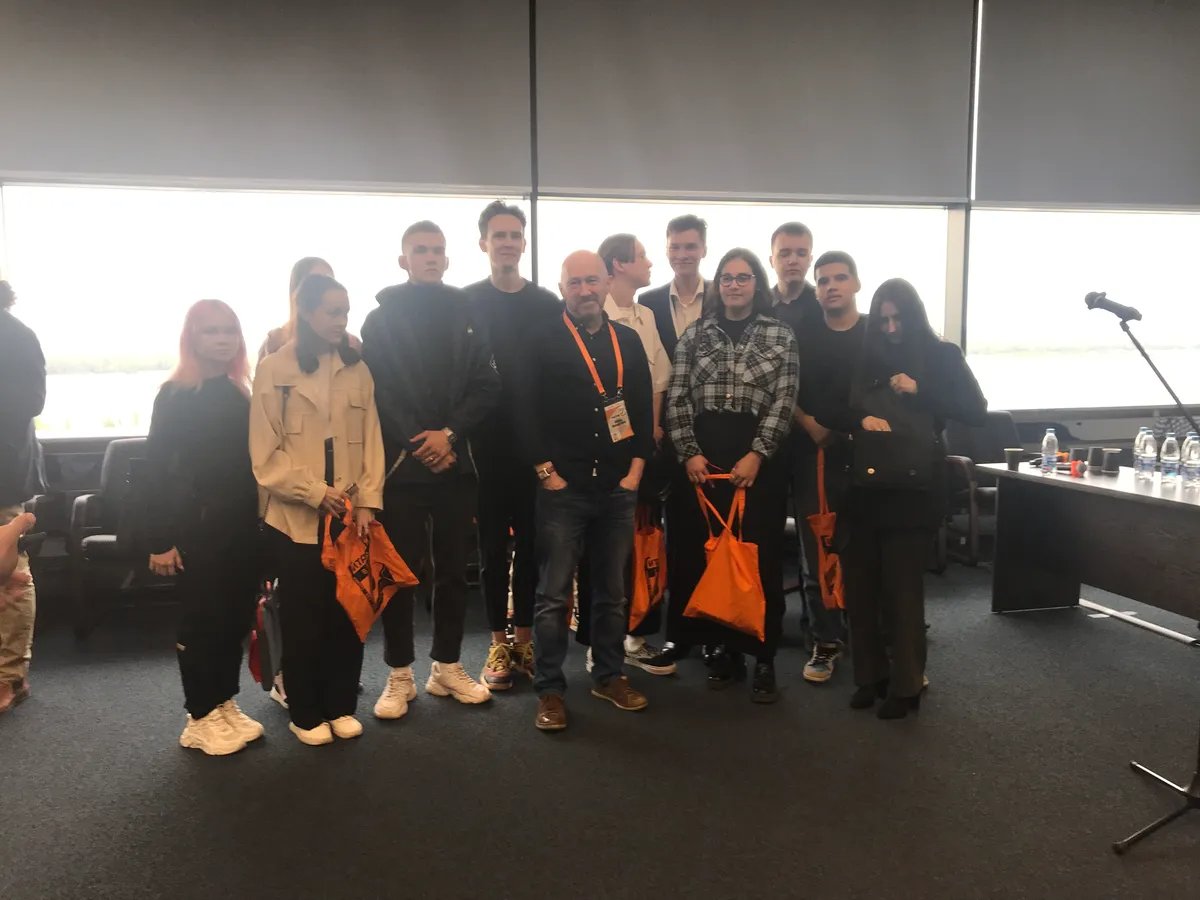
Michael Church and students. Photo: Irina Leonova, exclusively for Novaya Gazeta Europe
The whole festival was crammed with events promoting the cult of heroism and strength, and it was completely ruined in five minutes by one stocky schoolteacher from England. At least for those who listened to him.
In conclusion, Church said: “I worked as a teacher for many years and this is what I’ve learned: we have to teach children to think critically.”
But it was the other speakers that really took the cake.
Arkady Korolyov, associate professor at Samara State University, called for paying proper attention to source material. His pet grievance is the unjust vilification of Ivan the Terrible — the stories about him are allegedly “filled with lots of untruths”.
Victor Polyansky, head of the administrative law department at Samara State University, was eager to pick up from there:
“Or take, for example, the case of Stalin’s ‘personality cult’”, he chimed in. “There’s been so much dirt dumped on him!”
History, Polyansky explained, doesn’t get falsified for no reason — these are attempts by our country’s enemies “to deliver a strategic blow against Russia”.
I won’t quote from other such meetings since it was more or less the same thing everywhere. After one of these discussions, I went up to a group of students who attended these roundtables and asked how they liked what they had heard.
“Obviously, these are the sort of talking points that we can find on TV or somewhere else”, one of them grinned. “It’s awful, but given everything that’s going on now, it’s absolutely understandable. If you take my fellow students, the ratio is about 40 to 60: 40% understand the obvious and 60% think as they have been told here. But in my parents’ generation the ratio is 10 to 90, so 40 to 60 means there’s already some kind of positive dynamic.”
Делайте «Новую» вместе с нами!
В России введена военная цензура. Независимая журналистика под запретом. В этих условиях делать расследования из России и о России становится не просто сложнее, но и опаснее. Но мы продолжаем работу, потому что знаем, что наши читатели остаются свободными людьми. «Новая газета Европа» отчитывается только перед вами и зависит только от вас. Помогите нам оставаться антидотом от диктатуры — поддержите нас деньгами.
By clicking the Support button, you agree to the processing of your personal data.
To cancel a regular donation, please write to [email protected]
